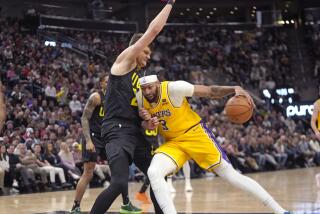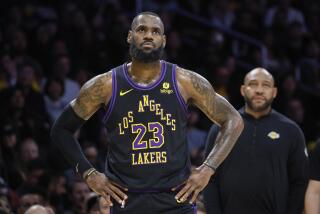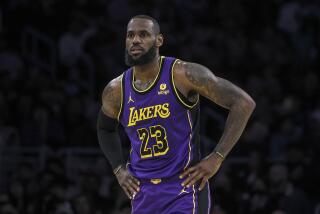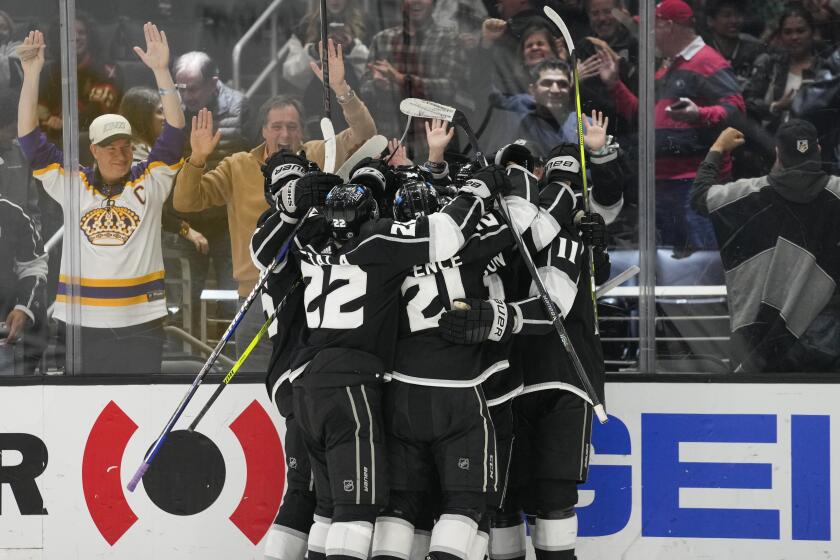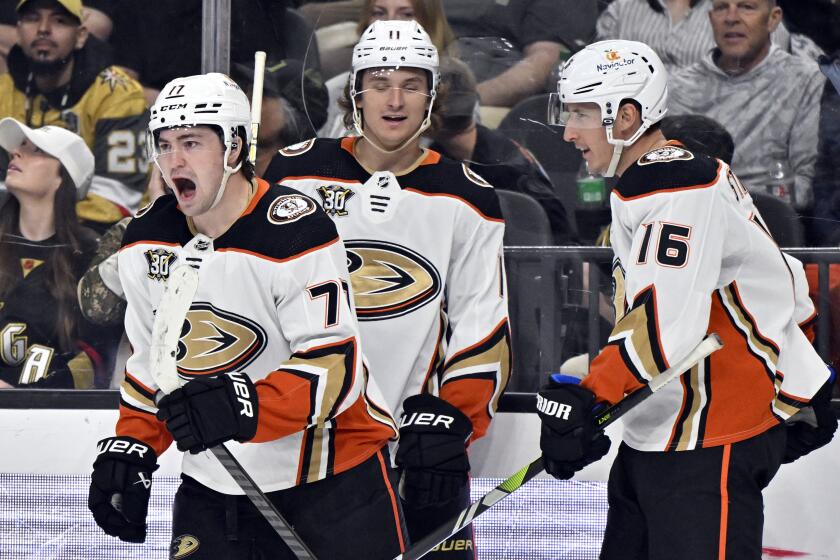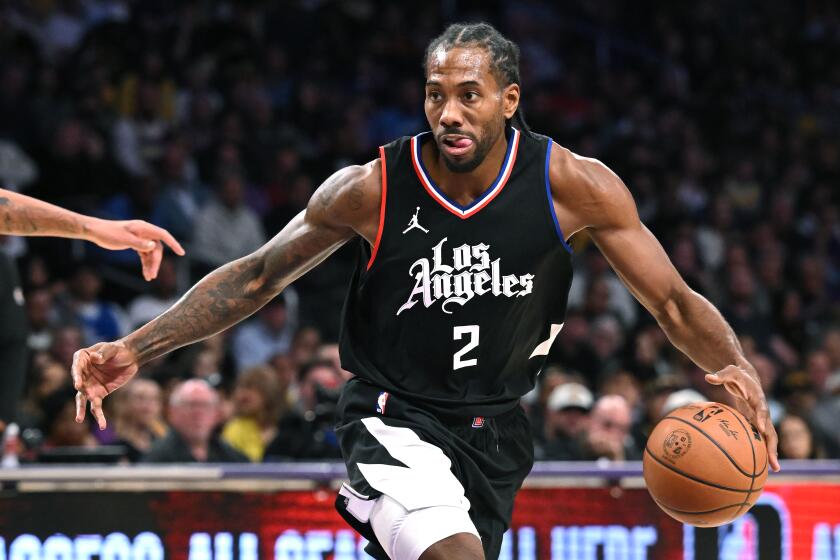Column: Thunder’s Paul George spurned Lakers to stay in a much smaller market and has no regrets
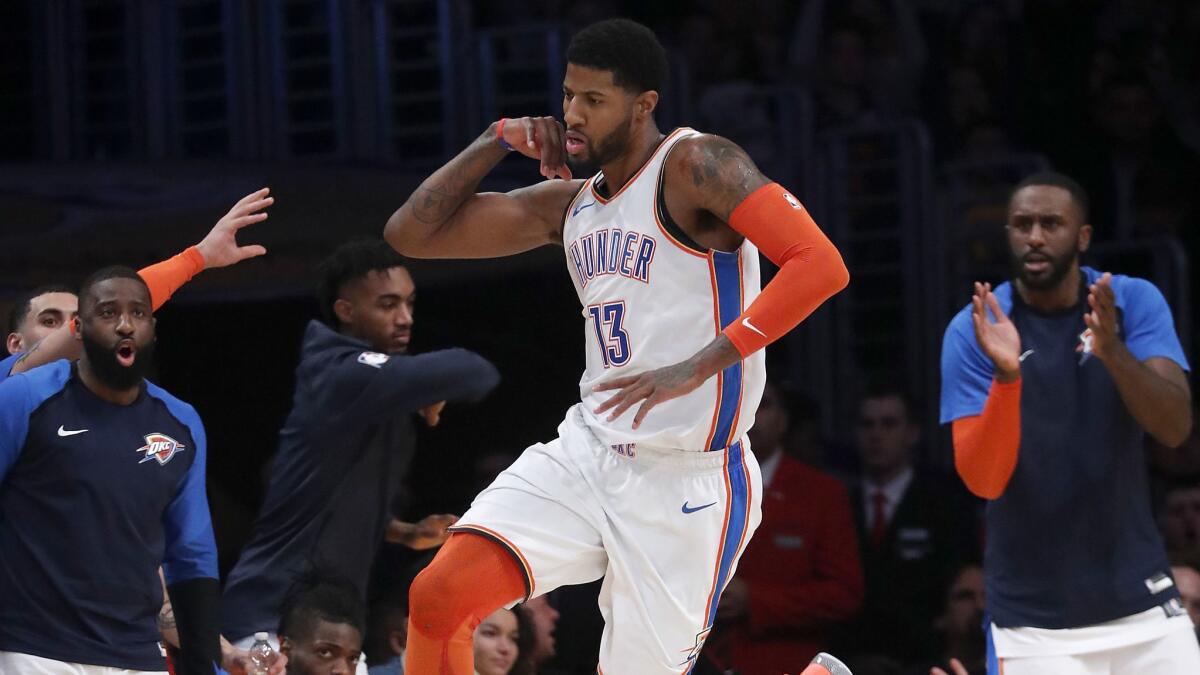
During a perfect January morning on Wednesday, the sun shining brightly, the air with just a slightest bit of bite, LeBron James’ video-game likeness slammed home dunk after dunk on a giant screen affixed to a hotel across the street.
You don’t have to work hard to imagine Paul George right there with him, throwing James lobs, celebrating wins, putting the Lakers instantly back into championship contention.
All he had to do was to show up, to do what he thought he wanted. All of it could’ve been his had he signed with the Lakers.
Instead, that night, George ran onto the court in front of a filled arena that had been waiting months to boo him.
A year ago, Lakers fans cheered every time he touched the ball to show George how much they wanted him to sign in free agency. Wednesday, they cheered when he botched a pick-and-roll with center Steven Adams, missed three-pointers and committed three early fouls, showing him how upset they were that he instead picked the Oklahoma City Thunder.
What makes George’s story unique is that he picked Oklahoma City. And he did it at a time where executives are bracing for New Orleans’ Anthony Davis and Milwaukee’s Giannis Antetokounmpo to head to bigger markets like New York or Los Angeles because that’s what superstar players do. They leave.
Why did George stay, announcing his decision to sign a four-year, $137-million contract in the first seconds of free agency, especially when he had a pretty good idea that James would later end up with the Lakers?
“This wasn’t a thing against LeBron, as if I didn’t want to play with him,” George said. “And, it wasn’t if I chose Russ [Russell Westbrook ] over LeBron. I just enjoyed where I was at. To be honest, those are two great players.
“To be honest, I wanted to give another chance, another shot, playing with Russ, who is one of the best point guards in the league. I gave it one year. I wanted to give it more time to develop and see what we could do.”
Thunder executives and staff members don’t know exactly how they managed to keep George — or for that matter how they were able to get Russell Westbrook to commit to a five-year extension in the summer of 2017.
It hasn’t been perfect — the Thunder lost Kevin Durant in free agency and the team traded James Harden. But keeping George and Westbrook? The Thunder are an outlier in a league in which power seems ready to move more and more to the coasts.
There are theories: There’s a lot of talk about ownership and management creating the right environment. The Thunder went out and got George, trading key players in Victor Oladipo and Domantas Sabonis to the Indiana Pacers, showing him they wanted him. They didn’t wait like the Lakers, who never made an offer that the Pacers couldn’t turn down.
And maybe Oklahoma City is kind of the right place for a player who wants to build a closeness with teammates with minimal distractions.
It’s more of a mosaic than one particular reason.
Organizationally, there’s a reputation that Oklahoma City is a place where people can do their jobs, where coaches can coach, where salespeople can sell, where players can play. Staffers swear that comes from a tone set by owner Clay Bennett.
“I just felt comfortable, felt at home,” George said.
There’s stability — a general manager, owner and star who have all been with the Thunder since their first seconds in Oklahoma City. That’s just not the case with the Lakers, who have had a major overhaul from the top parts of management on down in the last two years.
People also insist that Westbrook deserves a lot of the credit — not just for keeping George in Oklahoma City but for helping establish an on-court culture that matches what is happening in the front office.
At a shootaround Wednesday morning, Westbrook said he was proud of his role in keeping George and in proving that market size doesn’t have to matter. He’s spent his entire professional career in Oklahoma City, something that hasn’t kept him from trying to put a Mountain Dew in your hand and Air Jordan’s on your feet.
Westbrook didn’t want to trick George into staying in town. There was a more sincere desire to find the right partner to move forward with in the West.
“It’s not about making someone want to stay. It’s about creating a bond and friendship outside of basketball,” Westbrook said. “I think all the things that go on the court, all the numbers, are irrelevant. The most important thing is creating a bond and friendship with somebody.”
And George believed that the slower-paced way of living in Oklahoma City — a nicer way to say that there’s not as much to do as there is almost anywhere else in the NBA — is more conducive to forming those bonds.
A place like Oklahoma City, one of the NBA’s smallest markets, allows for players to linger around the locker room more. No one is worried about traffic. No one is worried about an incredible club night that they can’t miss.
“After practice, we’re not like, ‘Hey, let’s jet out of here. We’ve got to go to this place or go to that place.’ No, we’re spending time at the arena and at practice because there’s not as much going on,” George said. “There’s time for us to talk and just enjoy the fellowship. After practice, after games, we’re chilling. We’re laughing. We’re vibing. There’s no rush. Nothing is rushed in Oklahoma.”
And if George came to Los Angeles, it would’ve been rushed. Paired with James, the expectations would’ve been no less than a trip to the NBA Finals in Year One. And that kind of pressure helped doom the Westbrook-George-Carmelo Anthony Thunder team that lost in the first-round of the playoffs last spring.
Instead of that, George chose to stay, to build with Westbrook, to try and take on the Warriors and James from sleepy Oklahoma City.
And the excitement of Los Angeles? That’s not going anywhere.
“The thing is L.A. is home,” George said. “I’m here every summer. I spend three or four months here every year. It’s not like I’m missing much.”
Twitter: @DanWoikeSports
More to Read
Get our high school sports newsletter
Prep Rally is devoted to the SoCal high school sports experience, bringing you scores, stories and a behind-the-scenes look at what makes prep sports so popular.
You may occasionally receive promotional content from the Los Angeles Times.

